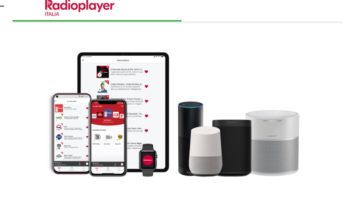
Promotional image for Rdio, above, and for Rivet News Radio and Swell, below.
Welcome to the first installment of Radio World’s What’sNext tech news. James Careless takes a look at interesting streaming services and digital developments related to the radio industry.
RDIO
Surprise! When it comes to giving music streaming listeners what they want, Rdio (www.rdio.com) has decided that they want … radio stations. That’s right: Virtual radio stations are at the heart of Rdio’s new free app.
Available for iOS, Android and Windows Phones, “Rdio’s free stations-first offering features 15 times more music than the leading Internet radio service and a wide variety of station types, including algorithmic artist- and genre-based stations, human-curated stations programmed to fit any mood or activity, personalized stations tuned to each individual listener, and stations based on tastemakers,” said a Rdio news release in September.
“What we’ve heard from our listeners is that free matters and stations matter, so we are taking a free stations-first approach to music and putting this at the forefront of the Rdio experience,” said spokesperson Lizzie Garlinghouse. This is why “free stations are now at the forefront of the user experience. Stations are threaded throughout the app — we’ve done away with the ‘stations’ section, and have instead built the entire listening experience around stations.”

RIVET NEWS RADIO
The Pandora of personalized audio news content, delivered directly to your smartphone: That’s the heady goal of Rivet News Radio (www.rivetnewsradio.com).
Operated by Chicago-based HearHere Radio — which raised $1.7 million in Convertible Promissory Notes to fund this venture — Rivet News Radio uses a personalized algorithmic approach to give listeners the news coverage they want, just as Pandora does for personalizing users’ musical selections.
All the user has to do is download the Rivet News Radio app to their Android or Apple (iOS) smartphone, sign in using Facebook or their email account, choose the news categories they want covered, and let the audio news roll in. The Rivet News Radio app also enables listeners to pause, rewind, skip, forward and favorite stories; and see Top Stories on their screen, plus preview what story is coming up next.

“Rivet delivers bite-sized news stories to provide listeners with the information they need in a 15 minute listening session,” said Terri Lydon, Rivet News Radio’s director of marketing. “Our newsroom has about 50 reporters and producers all led by our head of news, Charlie Meyerson. The team works 20 hours per day to create engaging stories in a conversational tone.”
Rivet News Radio is being targeted to business-to-business and business-to-consumer markets, with the company hoping to make money through advertising, subscriptions and licensing. “To date we’ve had 271K downloads across iOS and Android devices,” Lydon said. “In Q2 2014 we had 16K monthly active users, and we are finalizing B to B licensing deals that will be announced next month.”
The app is also entering the digital dash. Jaguar Land Rover has chosen it as a “preferred service” for its InControl Apps audio system. As of October, it will be available to Jaguar F-type and XE sedans this and to all JLR models in 2015.
SWELL
Apple’s July 2014 purchase of the Swell app closed down a powerful podcast search engine. “The Swell app offers a very simple interface that allows users to easily find podcasts; much like Pandora, it delivers suggestions based on what a user likes,” said Motley Fool contributor Daniel Kline.
“Apple’s own podcast app is hard to use and makes discovery relatively impossible. It’s fine if you know what you’re looking for but useless if you do not.”
Now that the Swell app team is working for Apple, Kline anticipates Swell functionality to turn up in a future Apple application. If it does, then a Swellified-iOs app would be further bad news for satellite radio, which is being outpaced by talk-based podcasts.
“SiriusXM used to be the best place for talk radio fans; Since the podcast world exploded that is no longer true as, while SiriusXM has Howard Stern and some other good talk options, the podcast world offers much more,” Kline said. “Previously it was hard to find those podcasts, but Swell made it a lot easier. Add that to everyone’s iPhones and the idea of paying for satellite radio to get talk shows seems silly.”
Is Kline right? Is SiriusXM at risk? We’ll have to wait for Swell capabilities to be added to the Apple app, and then see what happens.
James Careless is a longtime contributor. Send ideas for What’sNext to[email protected].












